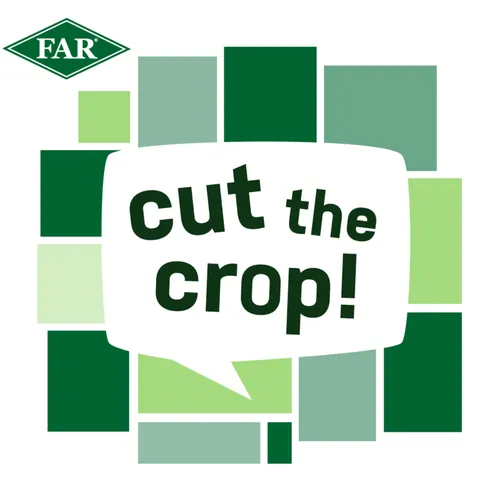
Cut the Crop!
keeping you in the know about everything you grow
- Update frequency
- every 7 days
- Average duration
- 19 minutes
- Episodes
- 109
- Years Active
- 2023 - 2025

Making the most of irrigation
Ahead of the new irrigation season, FAR regional facilitator and Canterbury irrigation management consultant Cindy Lowe provides some tips on irrigation scheduling. In this episode of Cut the Crop, s…

Introducing FAR’s new CEO Scott Champion
Since starting as FAR’s new CEO on July 1, Scott Champion has been meeting growers and industry leaders. In this week’s Cut the Crop episode, he tells Anna Heslop that he is looking to explore areas …

Adding value through research collaborations
Collaborating with overseas maize experts is a good way to learn from their failures and successes, FAR senior researcher Dirk Wallace says in this week’s Cut the Crop episode. Following several visi…

Biosecurity levy update
Seed and Grain Readiness and Response (SGRR) is the biosecurity entity for the arable sector and has played a key role in black-grass and fall armyworm incursions. In this episode of Cut the Crop, FA…

FAR’s research programme delivers options
Weeds, pests and diseases and herbicide resistance are just some of the key issues that FAR is researching to provide arable growers with more options for crop management. In this episode of Cut the …

Nuffield scholar fascinated by Brazil’s scale
During his Nuffield study travels, Central Otago farmer Carlos Bagrie was blown away by the scale and sophistication of arable farming in Brazil. In this episode of Cut the Crop, he tells Anna Heslop…

FAR opportunity for graduates
FAR’s graduate programme provides an introduction to all aspects of arable, from research and agronomy to marketing. In this episode of Cut the Crop, Anna Heslop talks to FAR’s current graduate Cathe…

Dame Alison Stewart reflects on her time at FAR
After seven years at the helm of FAR, chief executive Dame Alison Stewart has stepped down to pursue semi-retirement mixed with science advisory and directorship roles. Her tenure finished at FAR’s c…

Native plantings boost crop yields
Research shows that native plantings on farms do more than support biodiversity, they can also boost crop yields. In this episode of Cut the Crop, Plant and Food Research scientist Brad Howlett and r…

Irrigation NZ seeks long-term water vision
In this episode of Cut the Crop, Irrigation NZ chief executive Karen Williams says she wants a water strategy developed which brings together individuals and groups reliant on water, rather than it b…

Ag drones: challenges and opportunities
New Zealand’s agricultural drone industry is doubling every year, with more than 100 drones now used for spraying and spreading. In this episode of Cut the Crop, NZ Ag Drone Association president Cra…

Cost of Production data shows tight margins
For the last three years, FAR has been collecting Cost of Production data on five key crops, based on a Mid-Canterbury irrigated arable farm case study. In this episode of Cut the Crop, FAR’s Ivan La…

Expanding options for spring-sown oilseed crops
Following interest from growers, Canterbury-based Pure Oil NZ has successfully trialled spring-sown oilseed rape using new imported varieties. In this episode of Cut the Crop, Pure Oil agronomy manag…

Cover crops for weed management in maize grain systems
As well as providing benefits such as protecting soil and reducing nitrate leaching, cover crops can also suppress weeds. In this week’s Cut the Crop, FAR senior field research officer Sam McDougall …

Award-winning farmer positive about arable
Hawkes Bay mixed arable and livestock farmers Simon and Lou White, of Ludlow Farms, have just won not one, but two prestigious farming awards. Despite the setbacks of Cyclone Gabrielle and a farm acc…

FAR conference tackles arable profitability
Profitability is an increasing concern for arable farmers, which is why FAR has chosen it as the theme of its two-day conference, starting June 30. In this episode of Cut the Crop, FAR Communications…

Alternative energy options for farmers
Solar farms are popping up across New Zealand, but is this an option on high-value arable land? In this episode of Cut the Crop, Anna Heslop talks to Alan Brent, Professor of sustainable energy syste…

Opportunities and challenges for arable
Canterbury rural professional and farmer Thomas Holmes last year participated in the Kellogg Rural Leadership programme, focusing his study on opportunities and challenges for arable. In this episode…

Reducing the weed seed burden at harvest
Chaff decks, attached to the back of a combine harvester to reduce the weed seed burden, are widely used in Australia, but have not been adopted in NZ. In this episode of Cut the Crop, Chris Smith an…

Future Farm project expands to Southland
After a second harvest, a FAR demonstration block at Chertsey is showing the potential gains from using more future focused approaches including direct drilling and fewer inputs where possible. In th…